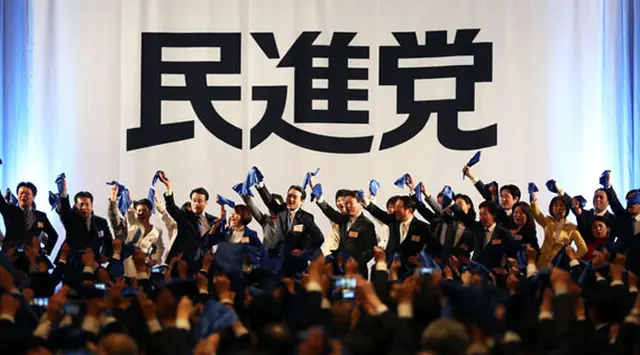Japanese opposition parties accelerated their realignment ahead of this summer's upper house election with the latest move of the formal establishment of the Minshinto, or the Democratic Party, on Sunday to confront the ruling coalition led by Prime Minister Shinzo Abe.
The Minshinto came through the merge of two major opposition parties, namely the Democratic Party of Japan (DPJ) and the Japan Innovation Party (JIP). With a total of 156 lawmakers in the bicameral national Diet, the newly-launched party became the largest opposition party since the Abe's administration was formed in late 2012.
Ambitiously calling the day of the party's establishment as a historic day, Katsuya Okada, who was the former DPJ leader and elected as the new party's chief, said that freedom, coexistence and responsibility for the future are the inaugural philosophy with which they start the Minshinto.
To make the new party more effective and efficient, the party appointed veteran politicians from both sides as its new executive members with Kenji Eda, a former leader of the JIP, elected as an acting party representative.
Former DPJ Secretary General Yukio Edano became the new party's secretary general, while Shiori Yamao, a former DPJ member, was picked as the party's policy chief.
During the inauguration, Okada noted that the Japanese public's basic rights are threatened and the country's pacifism endangered under the Abe administration, saying the new party aims at stopping the current government's "runaway" policy and eventually toppling the Abe-led ruling camp.
Prior to the merge, together with the Japan Communist Party and Social Democratic Party, the DPJ and JIP had filed bills to the parliament demanding the retraction of the controversial security laws which will take effect on Tuesday.
Okada said earlier that if the party made no progress in summer' s upper house election, he will not run in the leadership race later in the year. The Democratic Party is scheduled to hold a presidential polling in September.
But the latest poll released immediately after the launch of the new party showed that only 26.1 percent of the respondents said the party is "promising," while 67.8 percent are not holding expectations on the newly-launched opposition party.
The survey conducted by Japan's Kyodo News through the weekend also said that the Democratic Party secured 8 percent of support from the respondents, less than the combined 10.5 percent in approval rate the DPJ and JIP got in the previous poll. Abe's ruling Liberal Democratic Party (LDP) gained 41.3 percent of support rate.
Analysts here said that the low supporting rate for the Democratic Party followed the public disappointment for the former DPJ's three-year rule from 2009 to 2012 and the rushed merge of the two parties is hard to bear long-term feasible political and economic policies.
Meanwhile, election outlook for the new party this summer is tough as among the party's 60 seats in the upper house, 43 seats, or 72 percent, will run for this summer's election. Only 59 out of 136 from the ruling camp will run for the upper house poll.
Speculation here also showed that the prime minister would call a snap general election for the lower house simultaneously with the planned upper house election, meaning time left for the new party to prepare for the possible "double election" will be scarce and tasks for the party to regain trust from the Japanese public remain difficult. Enditem
 简体中文
简体中文





